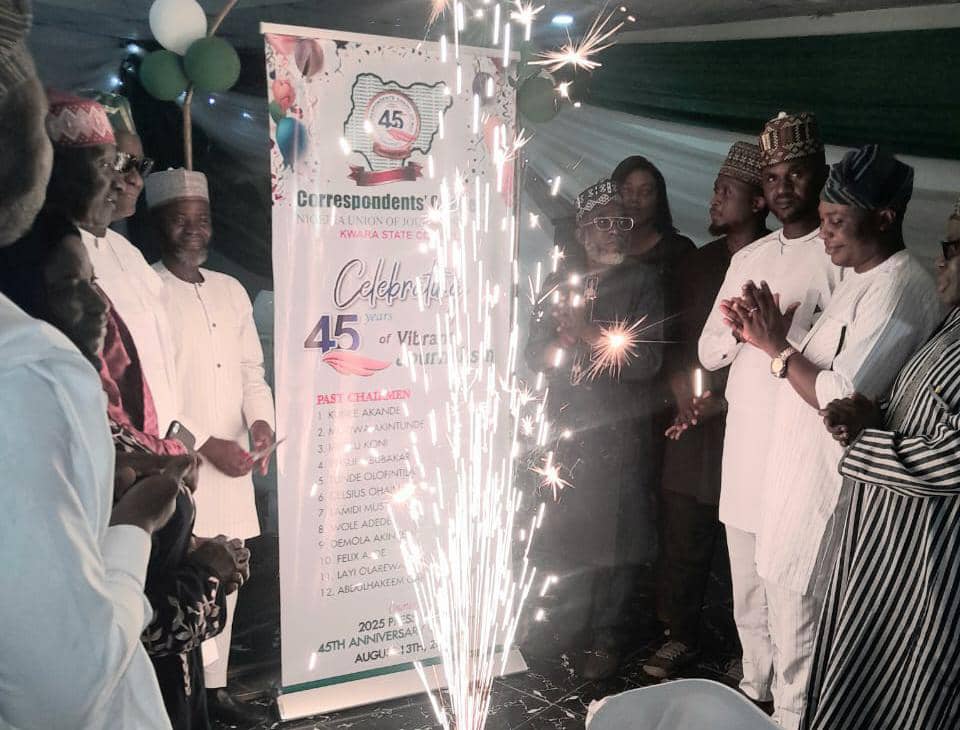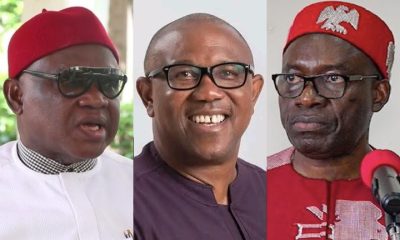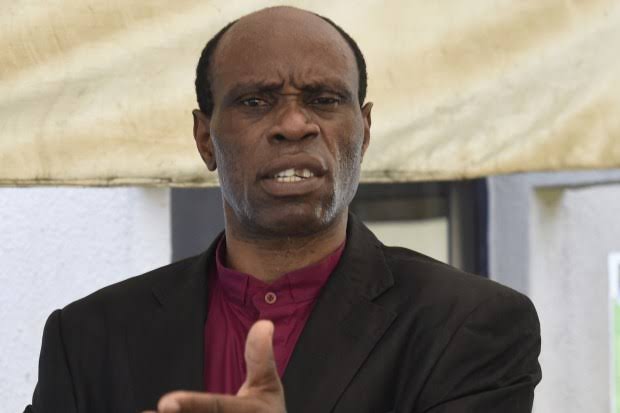Gallery
Kwara governor hails NUJ Correspondent Chapel as ‘elite journalists’ at 45th anniversary

Kwara State Governor, AbdulRahman AbdulRazaq, has described the Correspondent Chapel of the Nigerian Union of Journalists (NUJ) in the state as a body of “elite journalists,” commending their professionalism and constructive engagement with government over the years.
The governor, represented by his Chief Press Secretary, Mallam Rafiu Ajakaiye, gave the commendation on Wednesday during the chapel’s Press Week and 45th anniversary celebration, held at Shalom Hall, Government Reserved Area (GRA), Ilorin.
“The Correspondent Chapel of the NUJ are elite journalists and they have demonstrated this in Kwara. The last six years have seen them partner with the state government in our governance assignment and we are grateful,” Ajakaiye said.
He acknowledged the chapel’s critical reportage at times, noting that such scrutiny is integral to journalism’s role in a democracy.
The anniversary ceremony drew top government officials, dignitaries, and prominent personalities from across Kwara State and the North Central region.
In his remarks, Chairman of the Chapel, Mallam Abdulhakeem Garba, described the event as a milestone for journalism in the state and beyond.
> “We represent the best of journalistic professionalism,” he said, highlighting the role of correspondents in shaping credible reportage and fostering public trust in the media.
Elder Wole Adedeji, veteran journalist and former chairman of the chapel, took attendees on a historical reflection of the chapel’s journey, recalling its notable achievements, contributions to press freedom, and unwavering commitment to professional excellence.
Featured
Curiosity must return to journalism— varsity lecturer warns
Ilorin’s digital media scene expands with new online television

In a sharp critique of today’s news culture, broadcast journalist and Mass Communication lecturer, Raliat Ibrahim, has warned that dwindling curiosity among Nigerian journalists is leaving the profession vulnerable in an era dominated by algorithm-driven content.
Speaking on Sunday at the launch of Curious Television, a new online audio-visual platform in Ilorin, Ibrahim, who lectures at the Department of Mass Communication, Kwara State University, Malete, stressed that curiosity must once again drive news hunting and storytelling.
“Like the name of the television, curiosity should drive journalism.
“It is the only way to survive the onslaught of a digital world ruled by algorithms,” she said.
She lamented that audiences have changed, favouring short, unfiltered, and often sensational content churned out by citizen journalism.
To remain credible, she urged professionals to embrace civic, analytical, cultural, and technological curiosity.
The event also underscored Ilorin’s growing status as a digital broadcast hub, supported by reliable fibre optic coverage that is attracting innovative media ventures.
Curious Television, led by multiple award-winning journalist Olufemi Akobi, aims to highlight grassroots issues and bridge what he calls Nigeria’s “representation gap” in public discourse.
“Digital media gives us the power to connect people directly to conversations that shape their lives,” Akobi told guests, which included senior journalists, politicians, and policymakers.
With internet infrastructure enabling cost-effective broadcasting, Ilorin is increasingly drawing content creators who see the city as a viable base for reaching national and global audiences.
Media analysts say the success of Curious Television could further establish Ilorin as a magnet for Nigeria’s next wave of digital entrepreneurs.
Gallery
Google Gemini storybook turns Nigerian children into story heroes

(DDM) – Google has launched a new feature in its Gemini app called Storybook, allowing Nigerian families to transform personal moments into narrated, illustrated tales.
DDM gathered that with just a simple prompt and an image, Storybook can create a colourful 10-page adventure featuring a child as the main character.
The innovation taps into Nigeria’s rich storytelling tradition, where folktales have long been used to pass down wisdom and connect generations.
According to Taiwo Kola-Ogunlade, Google’s communications and public affairs manager for West Africa, the tool makes learning both personal and interactive.
He noted that storytelling has always been an integral part of Nigerian culture, but the challenge has been creating engaging educational materials tailored to each child.
Storybook enables parents and teachers to weave children directly into their own learning journeys.
With around 39 million Nigerian children aged six and under, the potential impact on early childhood education is significant.
Using Storybook is straightforward: users describe a story, upload a photo or drawing, and Gemini generates a narrated, fully illustrated book.
The stories can feature everything from bedtime adventures to playful retellings of everyday events.
One example shared by Google involved a father turning his job resume into a whimsical “day in the life” story for his daughter.
Kola-Ogunlade emphasised that the technology’s value lies in the personal expression it fosters, not just the AI itself.
He described Storybook as a “canvas for small, personal moments” that strengthen family bonds and cultural connection.
Beyond entertainment, the feature also offers a way to preserve cultural heritage.
Families can integrate local traditions, historical figures, and indigenous settings into their stories.
This approach can help children develop a deeper appreciation of their roots while enjoying personalised narratives.
Storybook can also be used to create meaningful gifts, such as tales that immortalise family milestones or honour ancestors.
To get started, users can visit gemini.google.com/gem/storybook, enter their story idea, and optionally add images to personalise the plot.
The feature is available globally on both mobile and desktop platforms from today.
Industry observers believe this could open new opportunities for digital learning in Nigeria’s homes and classrooms.
As technology continues to merge with tradition, tools like Storybook could redefine how the next generation experiences storytelling.
Gallery
FUOYE receives NUC nod for new Academic Programs
The National Universities Commission (NUC) has officially approved the Federal University Oye-Ekiti (FUOYE) to launch seven new academic programs.
This significant step forward marks an important milestone for the university’s commitment to academic excellence and innovation.
Consequently, the approved programs include B.Sc Information and Communication Engineering, B.Sc Broadcasting, B.Sc Journalism, and B.Sc Public Relations.
Additionally, M.A. (Ed), M.Phil, and Ph.D. in English Language Education have also been sanctioned. Furthermore, B.Eng.
Systems Engineering and PGD, M.Sc, and Ph.D. in History and International Studies will be offered.
This expansion of academic offerings underscores FUOYE’s dedication to providing quality education.
By introducing these programs, the university aims to meet the evolving demands of the job market and equip students with essential skills.
Moreover, these new programs are expected to attract a diverse student body, enhancing the overall academic environment.
As a result, the institution will contribute significantly to the development of skilled professionals across various fields.
In doing so, FUOYE reinforces its role as a leader in higher education.
Ultimately, this initiative not only benefits students but also supports the broader community’s growth and development.
The approval of these new programs by the NUC highlights FUOYE’s commitment to educational excellence and innovation.
This exciting development paves the way for future opportunities and advancements within the university.
Celebrity/Entertainment
Photos From The Burial Of General Aguiyi Ironsi In 1966

On 29 July 1966 General Aguiyi-Ironsi spent the night at the Government House in Ibadan, as part of a nationwide tour.
His host, Lieutenant Colonel Adekunle Fajuyi, Military Governor of Western Nigeria, alerted him to a possible mutiny within the army.
Aguiyi-Ironsi desperately tried to contact his Army Chief of Staff, Yakubu Gowon, but he was unreachable.
In the early hours of the morning, the Government House, Ibadan, was surrounded by soldiers led by Theophilus Danjuma.
Danjuma arrested Aguiyi-Ironsi and questioned him about his alleged complicity in the coup, which saw the demise of the Sardauna of Sokoto, Ahmadu Bello.
The circumstances leading to Aguiyi-Ironsi death still remain a subject of much controversy in Nigeria.
His body and that of Fajuyi were later discovered in a nearby forest.
Here are some photos from the burial of Nigeria’s first military Head of State, Major General Aguiyi Ironsi who was killed in the July 1966 Northern Nigeria counter coup.
-

 Featured4 days ago
Featured4 days agoYour Attacks on Peter Obi Are Petty, Stop It! Chekwas Rebukes Soludo
-

 News3 days ago
News3 days agoTension in Anambra community as senior police officer shoots kinsman dead
Colleagues, others try cover-up; victim's family fights back
-

 News6 days ago
News6 days agoAnambra South Bye-Election: APC Chief Rescues Deputy Gov Caught In Vote Buying From Angry Youths
By Chuks Collins, Awka
-

 News5 days ago
News5 days agoNigerian visa applicants must provide 5-yr social media history — US embassy
-

 Celebrity/Entertainment20 hours ago
Celebrity/Entertainment20 hours agoHow Nigerian TikToker Geh Geh Made ₦45 Million in One Night
-

 Analysis6 days ago
Analysis6 days agoSystemic Sabotage: How APC, INEC Colluded To Undermine Amamgbo’s Senatorial Bid
By Arthur Ezechukwu
-

 News3 days ago
News3 days agoTerrorist Organisation: APC, PDP Members in US, UK, France Risk Deportation
-

 Celebrity/Entertainment5 days ago
Celebrity/Entertainment5 days agoWhy single mothers can’t raise boys into proper men — Jim Iyke
-

 News6 days ago
News6 days agoBREAKING: Troops arrest Nigeria’s most wanted terror kingpin
-

 News2 days ago
News2 days agoVandal electrocuted while vandalizing Aba power infrastructure












